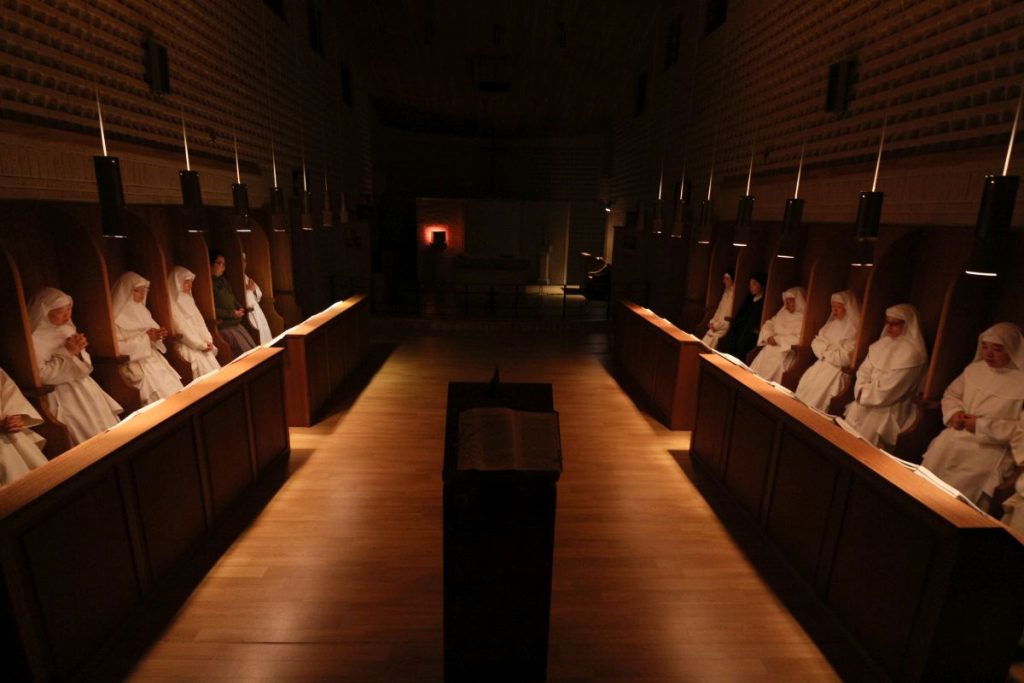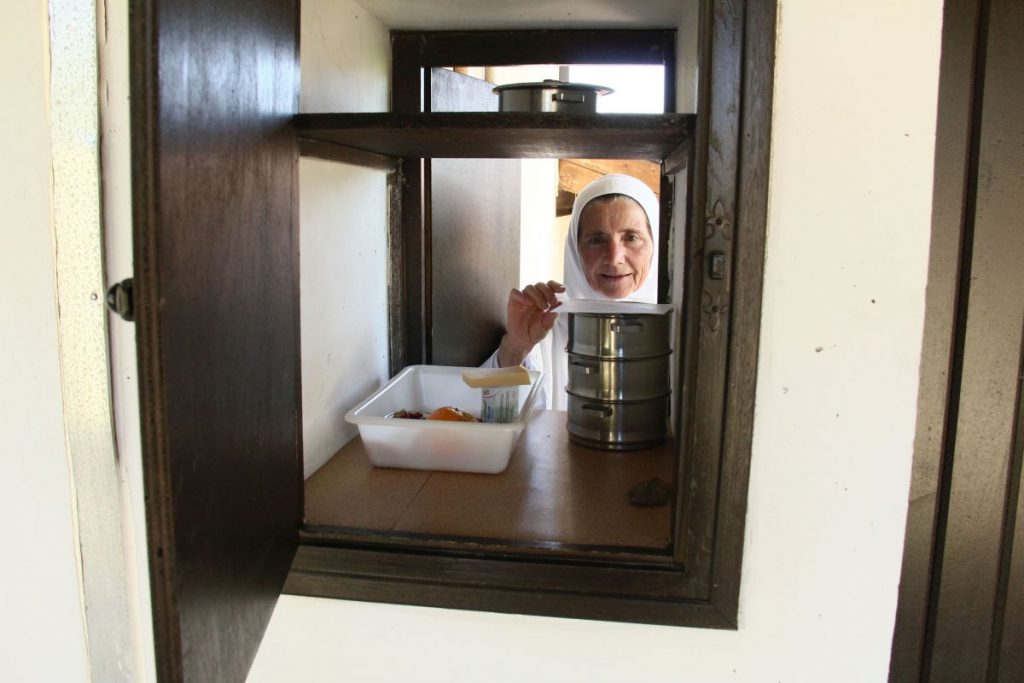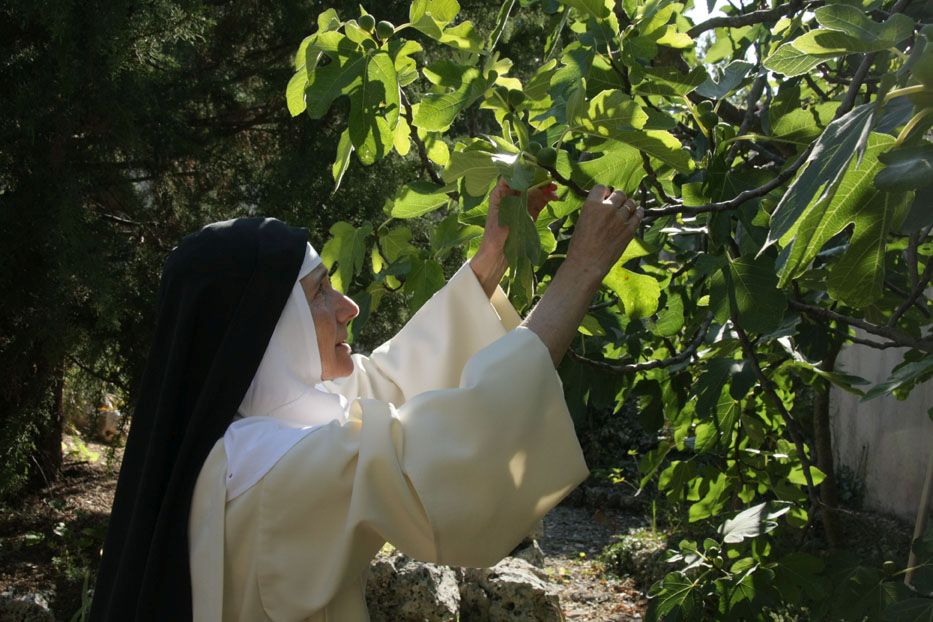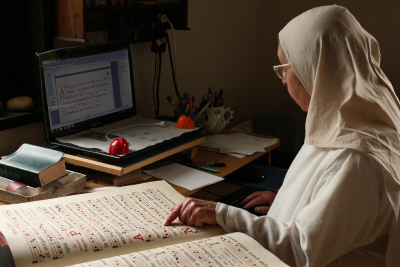God alone suffices. For Him, Carthusian nuns have forsaken everything
The Typical Day
For you, to whom our life poses a question, we are going to describe what we do day after day. We will explain what the typical schedule is but this may be slightly different depending on the house, but the overall structure is the same. We will try to explain to you something about why we have chosen this life. But, fundamentally, the choice is a response to a call from God. And why God has called us is his secret alone!

| The « nuns of the cloister or cloister nuns» sometimes called choir nuns, are called to seek God in the solitude of their cell. Ordinarily, they leave their cell only to go to the church. |

| The « converse nuns » serve God in their own form of solitude and recollection, which allows them at the same time to provide by their work for the needs of the house, which have been especially entrusted to their care. |
At the Heart of the Night
Our monastic day begins around midnight with a prayer to the Virgin Mary who continues to spiritually engender in us the life of Christ.
00:15 We hasten to church for the night office. A time of singular importance in the Carthusian liturgy, the night vigils are a clear sign of the orientation of our life: for through them is expressed the watchful expectation for the Saviour, and the prayer that a dawn of resurrection may rise over the darkness of the world.
When they celebrate the divine office, the nuns are the voice and heart of the Church which, through them, presents to the Father in Jesus, praise, supplication, adoration and humble request for pardon.
In order to allow each one to respond to her own grace, the converse sisters have the freedom to choose among the diverse forms of liturgical prayer. During the Eucharist and the offices in church, they may participate completely in the chant and psalmody, or partially, or pray silently.


The vigils which include the morning praise (Lauds) last two hours on average. Then the nun returns to her cell. As she does each time she enters her cell, she entrusts to Our Lady the time of solitude which is given to her, then she sleeps until 6:30.
Morning Praise in the Secret of the Cell
7:00 We are called to prayer. A prayer of thanksgiving for the wonders of creation and for the resurrection of Our Lord who takes us with him, the office of Prime is recited by each nun in her cell. At the sound of the bell, all pray together at the same time, thereby making the monastery one single praise to the glory of God.
According to their orientation, the converse sisters can recite the same office of psalms as the cloister nuns, or an office composed of Our Father’s, Hail Mary’s, and Glory Be’s, which sums up, in itself, all prayer and links her to a long monastic tradition. Whatever the formula, this liturgical prayer is an office of the Church. Through the Carthusian Order, the Church entrusts the nun with a true ministry.


Next, a time of silent prayer follows. The Carthusian nun tries to offer to God a simple heart and purified spirit, and to fix her thoughts and affections on Him. If she is faithful to this day after day, there will be born in her, from that very silence, something that will draw her to more silence. And in this silence she will be graced not just with serving God, but with cleaving to Him.
Eucharist and Solitude
This cleaving of the nun to Christ is re-enforced in the celebration of the Eucharist to which the sound of the bell invites us at 8:00.
The conventual liturgy is chanted for the most part. Our own rendition of Gregorian chant is one element of the patrimony of our Order which we have kept from the beginning because it fosters interiority and spiritual sobriety. The rite of our liturgy was adapted to the directives of the Second Vatican Council.


The Eucharist sacrifice is the centre and high point of our life, the manna for our spiritual journey in the desert, which brings us through Christ to the Father. The desert is the cell to which we return after Mass.
Alone with God
From the office of Terce until Vespers at 16:00 the nuns of the cloister usually do not leave their cells. And the converse sisters, when their duties do not call them to be outside the cell, always return to it as to a very sure and tranquil haven. Both, once within, the door being closed and all care and preoccupations left without, abide peacefully under the gaze of God and pray to the Father in secret.
Our Lord made himself the foremost and most vivid example of our vocation when He retired alone to the desert and gave himself to prayer. In the same way, just as His Passion was approaching, He left even his Apostles to pray alone…
Our solitude, like Jesus’, is not only that of the body and heart, but also of all that could be an obstacle to our face to face encounter with God. That is why we seek to content ourselves with what is strictly necessary, preferring to follow Christ in his poverty, and by this poverty to be enriched. We keep abstinence once a week, on Fridays or on the eve of liturgical feasts to prepare ourselves for the coming of Our Lord.
Study, Work, lectio divina:
the heart and the mind seek the Lord
Lectio divina
God speaks to us in the Bible, and that is why the nun meditates assiduously on sacred Scripture until it becomes part of her very being. By lectio divina, or reading prayerfully the Word of God in Scripture, she enters into communion with Christ, and Christ in turn reveals to her the Father.
« If anyone loves me, he will keep my words and my Father will love him and we will come to him and make our dwelling place with him » (Jn 14,23).
Like Mary who carefully preserved in her heart all her memories and reflected on them, the nun immerses herself in the Word of God to listen to what the Spirit wants of her at that moment.
The converse nun dedicates a half hour to lectio divina in cell after Terce; this enables her to be able to live on the Word of God throughout the whole day.


Study
The cloister nun spends an hour in lectio divina, after which she devotes herself either to study or to manual work, inside her cell.
For a year and a half novices study biblical and monastic writings; doctrinal and moral theology come after. These studies proceed at a rate adapted to the needs of each one. They lay the foundations for a fruitful reading of the Word of God. The solitary does not read to keep pace with all the latest trends, but to nourish her faith in tranquillity and to sustain her life of prayer. Wisely ordered reading gives the mind greater steadiness, and is a support to contemplation.
… The body also participates
The converse sister works in an obedience. We call “obedience” the duty entrusted to a nun and, by extension, the place where she accomplishes it. For example, if a sister has the responsibility of cooking, both cooking and the kitchen where she cooks are her obedience. In order to allow them to better live their vocation, the work of the converse sisters is distributed in such a way that each one works alone, as far as this is possible.


Whether it is washing the dishes or peeling vegetables, picking fruit or tending the garden, this work becomes an expression of her union with the Son of God in his love for the Father and for all people.
Sext and None
At 12:00 the office of Sext ends the morning and makes explicit praise to God. The converse nun returns to the cell where she recites Sext. As for the cloister nun, she takes her meal, enjoys a period of relaxation, and then recites None, all within the recollection of the cell.
We find our meal in the food-hatch, which is an opening in the wall near the door which opens onto the cloister. The food-hatch or ‘guichet’ allows each solitary some link with her community without her having to leave the cell or interrupt silence.


The sisterly bonds in the Charterhouse are thoroughly imbued with the silence of God. Actually, these ties of love are all the stronger to the degree to which the aspiration of each nun to recollection is more fully respected. For my sister as for myself, solitude is a sacrament of the encounter with God. Accordingly, the more I love my sister in God, the more I respect her life of solitude and silence.
The rest-time which follows the meal we almost always spend in cell: either outside in the garden (tending to it, or walking and watching nature), or inside (doing some light work). As St. Bruno and the early monks state: « If the bow is kept continually taut, it looses its resilience and becomes less fit for its works».

14:00 The bell invites us anew to psalmody with reverence for God. It is the office of None, a prayer we usually recite alone in cell, yet in solidarity: since Our Lord has called us to represent all of creation when we come before Him, in our prayer we intercede and give thanks for all.
The work-time that follows can also be lived in thanksgiving if we accompany Jesus in his humble and hidden life in Nazareth, where He performed His duties in uninterrupted union with the Father. Those who have made a definitive commitment in the Charterhouse generally work until Vespers.
The converse sisters leave cell to resume working in their obedience and so praise God in his works and consecrate the world to the glory of its Creator.


The cloister nuns work in cell in a variety of occupations: bookbinding, sewing, weaving, typing, small-scale woodworking, making icons, etc. all their talents can find expression.


Work, which is a service uniting us to the Christ who came not to be served but to serve, has always been regarded in the monastic tradition as a very efficacious means of progressing towards perfect charity.
Evening Praise
16:00 The bell summons us to Vespers. On passing through the door of the church, we enter into the dwelling place of God, and also into a time of prayer which marks the end of the day. The evening prayers of praise are celebrated as the decline of the day invites the soul to a spiritual sabbath, because «a sabbath rest still remains for the people of God» (Heb 4,9).


Conscious of our responsibility, we put ourselves at peace, in openness to God alone.
The converse sister can participate in the praises in the church or she can let them rise from her heart in the silence of her cell. Any work that follows remains imbued with that spirit of praise. Once her work is finished, the nun returns to her cell where she consecrates herself to silent prayer like her cloister sister.
After the meal (or collation if it is a day on which we are observing a fast) we have a period of free time at our disposal. Spiritual reading precedes Compline.
19:00 The day ends with the office of Compline, which prepares for the night rest. This prayer ends with a vocal or silent prayer to Mary. The filial love of the Carthusian for the Virgin can be expressed by the recitation of her office. This office is a participation in the Virgin’s thanksgiving for Redemption.


*
On Sundays and solemnities, as well as on walking days, the schedules are a little different, giving more place to common life and family spirit.











